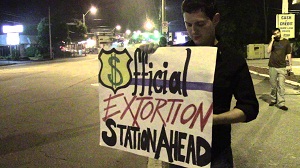New 'Traffic Violations Agency' Brings Buffalo Extortion Racket to All Time Highby Asa JPolice State Daily Feb. 09, 2016 |
Popular 
Eloy Adrian Camarillo, 17, Arrested in Shooting Death of Infowars Reporter Jamie White

NYT: Trump Ended War With Houthis After They Shot Down U.S. Drones, Nearly Hit Fighter Jets

Ben Shapiro, Mark Levin and Laura Loomer Warn of Foreign Influence... From Qatar

Report: Hamas Says Witkoff Promised to Lift Gaza Blockade in Exchange for Edan Alexander

Trump Advisor to Washington Post: 'In MAGA, We Are Not Bibi Fans'
  After Buffalo, New York created its new "traffic violations agency" on July 1 of last year, the city has seen a substantial boon to its extortion racket. With the help of new software, ticketed drivers are now receiving an average of three citations per stop and the city has already moved to suspend the licenses of 4,400 drivers, an official said. After Buffalo, New York created its new "traffic violations agency" on July 1 of last year, the city has seen a substantial boon to its extortion racket. With the help of new software, ticketed drivers are now receiving an average of three citations per stop and the city has already moved to suspend the licenses of 4,400 drivers, an official said.In the last six months of 2015, officers wrote 30,000 tickets, almost 10,000 more than during the same period in 2014. This means the city in on pace to pocket literally millions of extra dollars in revenue in the coming years. According to Buffalo budget makers, in the first seven months of operation, $682,000 has been extracted from motorists. These type of extortion schemes are nothing more than legalized plunder. The great 19th century French philosopher and economist Fredric Bastiat defined legal plunder as "the act of appropriating, under the laws, the property of others." In his seminal work, The Law, he stated the following: When plunder becomes a way of life for a group of men in a society, over the course of time they create for themselves a legal system that authorizes it and a moral code that glorifies it.This is exactly what government law enforcement presupposes: plunder. As government is devoid of any genuine feedback mechanism -- primarily, profit and loss -- it is unable to glean, relative to demand, if what it is engaged in is overall benefit to society. Compulsive funding via taxation means government makes its own priorities for what police should be doing, which leads to things like the drug war and arbitrary victimless traffic enforcement -- things that in a market economy, voluntary paying customers would be unlikely to compensate security providers for. The new draconian traffic enforcement rollout has already been equated to just another form of taxation by people like attorney and a former Amherst town supervisor, John Ward. "A lot of traffic tickets are being written everywhere," Ward said. "A lot of them are kind of needless. What it's really become is a third level of taxation. Nobody wants to say 'We are raising taxes,' but this is a way of doing it." Others, like John Bowman, agree. Bowman is vice president of the Wisconsin-headquartered National Motorists Association, an organization "dedicated to protecting the rights of the motoring public." "The timing is quite coincidental, isn't it?" said Bowman. "Certainly there has to be a revenue incentive there for writing all those tickets. I can't imagine that all of a sudden 50 percent more people are speeding or running red lights." Bowman's organization rightly argues that the traffic-ticket system needs reform nationwide. Police and judges have a direct financial incentive to enforce traffic laws and set fines in a manner that directly benefits their agencies, personnel and local governments. To help curb political self-interest, the association advocates for a process that would send all money collected from fines to state capitals. From there, funds would then be distributed back to local governments based on population. While this type of reform might have some immediate effect on the traffic enforcement racket, in the long term, further centralization in the states will prove troublesome as deals are made and funds are then reallocated based on political expediency. What is needed is further decentralization: a system where direct market actors provide economic incentive based on what they are willing to pay security providers. Within this paradigm – a system funded voluntarily and not by coercive taxation – such abuses would decrease dramatically as customers refuse to pay for such extortion schemes levied against them. |



